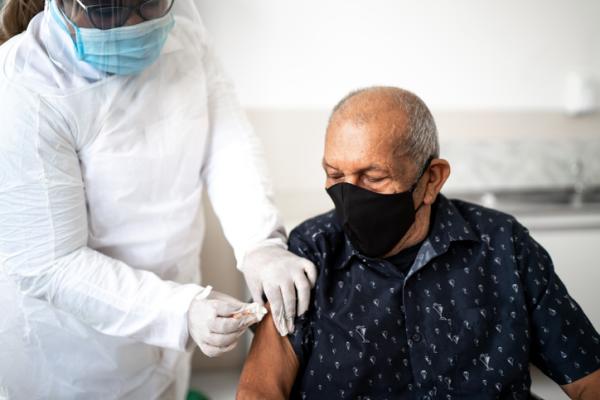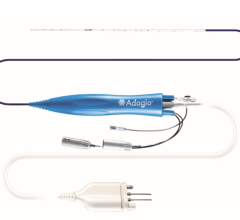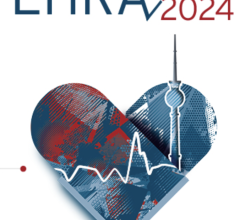
Getty Images
June 23, 2022 — The COVID-19 vaccination is not associated with an increased risk of heart attack or stroke in patients with established cardiovascular disease, according to a large study published in Cardiovascular Research, a journal of the European Society of Cardiology (ESC).1
“Our study showed that pre-existing cardiovascular disease should not prevent people from getting vaccinated against COVID-19,” said study author Dr. Esther W. Chan of the Li Ka Shing Faculty of Medicine, The University of Hong Kong, Hong Kong Special Administrative Region, China. “Vaccination is particularly important for this group since cardiovascular disease is associated with worse outcomes and a higher risk of death after COVID-19 infection.”
This was the first study to examine the association between COVID-19 vaccines and the risk of major adverse cardiovascular events (MACE) in patients with cardiovascular disease. The study focused on BNT162b2 and CoronaVac, the only COVID-19 vaccines authorized for emergency use in Hong Kong.2
The researchers linked data from electronic health records managed by the Hong Kong Hospital Authority, which covers around 80% of hospital admissions, and vaccination records provided by the Hong Kong Department of Health. The first two doses of vaccine were included in the analyses. Individuals were not permitted to switch between vaccine types for the first two doses.
The investigators identified patients with existing cardiovascular disease and a new MACE diagnosis between 23 February 2021, when the mass COVID-19 vaccination program started in Hong Kong, and 31 January 2022. Established cardiovascular disease includedeathd coronary heart disease, cerebrovascular disease, peripheral vascular disease, and prior interventions such as stenting. MACE included myocardial infarction, stroke, revascularisation or cardiovascular death.
The researchers used the self-controlled case series study design, which was developed to assess the risk of adverse events after vaccination. Each patient was compared with himself/herself for the risk of MACE up to 27 days after each vaccine dose (exposure period) versus the non-exposure baseline period. Dr. Chan explained: “A traditional cohort study would compare the vaccinated group with the unvaccinated group but the two groups could have different baseline characteristics. A self-controlled case series avoids the issue of differences between groups since each individual acts as his/her own control.”
A total of 229,235 patients with cardiovascular disease were identified, of which 1,764 were vaccinated and experienced MACE during the study period (662 received BNT162b2 and 1,102 received CoronaVac). For BNT162b2 and CoronaVac, the researchers estimated incidence rate ratios (IRRs) to compare the risk of MACE during the 13 days after vaccination compared to the baseline period. IRRs were also calculated for the risk of MACE during days 14 to 27 post-vaccination versus the baseline period. The analyses were conducted for the first and second doses.
There was no evidence of an elevated risk of MACE after the first or second dose of BNT162b2 or CoronaVac. For the first dose of BNT162b2, the IRRs were 0.48 (95% confidence interval [CI] 0.23–1.02) during the first 13 days post-vaccination and 0.40 (95% CI 0.18–0.93) during days 14 to 27 days after vaccination. For the second dose, the IRRs were 0.87 (95% CI 0.50–1.52) during the first 13 days and 1.13 (95% CI 0.70–1.84) during days 14 to 27 after vaccination.
For the first CoronaVac dose, the IRRs were 0.43 (95% CI 0.24–0.75) during the first 13 days and 0.54 (95% CI 0.33–0.90) during days 14 to 27 post-vaccination. For the second dose, the IRRs were 0.73 (95% CI 0.46–1.16) for the first 13 days and 0.83 (95% CI 0.54–1.29) during days 14 to 27 days after vaccination.
Dr. Chan said: “The findings were consistent for women and men, individuals aged under and above 65 years old, and patients with different underlying cardiovascular conditions. The results should provide reassurance about the cardiovascular safety of these two vaccines."
For more information: https://www.escardio.org/
References:
1Ye X, Ma T, Blais JE, et al. Association between BNT162b2 or CoronaVac COVID-19 vaccines and major adverse cardiovascular events among individuals with cardiovascular disease. Cardiovasc Res. 2022. doi:10.1093/cvr/cvac068.
https://academic.oup.com/cardiovascres/article-lookup/doi/10.1093/cvr/cvac068
2BNT162b2 is the Pfizer-BioNTech vaccine while CoronaVac is the Sinovac vaccine.
Find more related Coronavirus content
Related Long-COVID Content:
MRI Sheds Light on COVID Vaccine-Associated Heart Muscle Injury
What We Know About Cardiac Long-COVID Two Years Into the Pandemic
VIDEO: Long-term Cardiac Impacts of COVID-19 Two Years Into The Pandemic — Interview with Aaron Baggish, M.D.
VIDEO: Long-COVID Presentations in Cardiology at Beaumont Hospital — Interview with Justin Trivax, M.D.
VIDEO: Cardiac Presentations in COVID Long-haulers at Cedars-Sinai Hospital — Interview with Siddharth Singh, M.D.
Find more COVID news and videos
Related COVID Content:
COVID-19 Fallout May Lead to More Cancer Deaths
Kawasaki-like Inflammatory Disease Affects Children With COVID-19
FDA Adds Myocarditis Warning to COVID mRNA Vaccine Clinician Fact Sheets
CMS Now Requires COVID-19 Vaccinations for Healthcare Workers by January 4
Cardiac MRI of Myocarditis After COVID-19 Vaccination in Adolescents
Small Number of Patients Have Myocarditis-like Illness After COVID-19 Vaccination
Overview of Myocarditis Cases Caused by the COVID-19 Vaccine
Case Study Describes One of the First U.S. Cases of MIS-C
NIH-funded Project Wants to Identify Children at Risk for MIS-C From COVID-19


 August 29, 2025
August 29, 2025 









